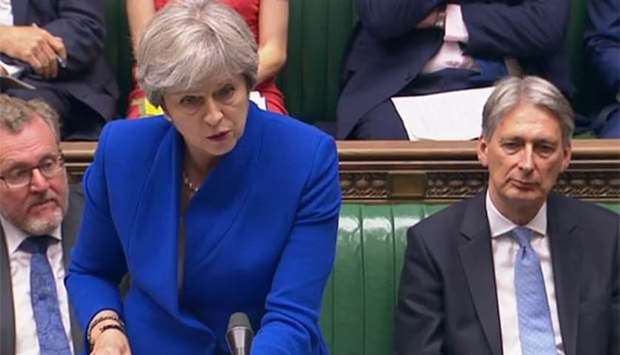A landmark bill intended to smooth Britain's exit from the European Union faced a rocky first ride in parliament on Thursday, as the EU's chief Brexit negotiator voiced scepticism about British proposals.
The bill provides for the repeal on Brexit day of the 1972 European Communities Act that conferred Britain's membership, and also converts an estimated 12,000 existing European regulations into British law.
Ministers say it is the first step in implementing last year's referendum vote for Brexit, and will provide legal continuity to ensure no ‘cliff-edge’ when Britain leaves the bloc in March 2019.
‘Without this legislation, a smooth and orderly exit is impossible,’ Brexit Secretary David Davis told MPs in the House of Commons, as Prime Minister Theresa May sat by his side.
But critics accused May's government of an unprecedented power grab.
Opposition parties say it represents an ‘unacceptable’ extension of executive power by allowing ministers to amend EU laws as they are transferred without proper parliamentary scrutiny.
‘It's an unprecedented power-grab,’ said Labour's Brexit spokesman Keir Starmer, raising particular concern that the powers could be used to implement parts of the final withdrawal deal agreed with Brussels.
‘That we are leaving is settled. How we leave is not. This bill invites us to surrender all power and influence over that question to the government and to ministers,’ he said.
The bill is the first parliamentary test for May since her Conservative party lost its majority in the June election, and was forced into an alliance with Northern Ireland's Democratic Unionist Party.
Meanwhile Brexit negotiator Michel Barnier in Brussels revealed how much work remains to agree the divorce, as he criticised Britain's proposals to resolve the fraught issue of the Irish border after Brexit.
Barnier said London's proposal ‘worries me’, as did the slow progress of talks, which he said he was now ready to speed up.
- 'Power-grab' -
May said the Repeal Bill was ‘the single most important step we can take to prevent a cliff-edge for people and businesses, because it provides legal certainty’ after Brexit.
Ministers also hope that preserving the equivalence between EU and British law, at least initially, will make it easier to agree a new trade deal with the bloc.
Once the EU laws are transferred, some of them will need to be amended to take account of the changed circumstances of Brexit -- for which the bill proposes an expansion of existing executive powers.
Officials estimate that around 800 to 1,000 such changes will be needed -- far too many to involve full parliamentary scrutiny in each case.
The use of these so-called Henry VIII powers would expire two years after Brexit and could not be used to raise taxes or amend human rights law.
But there remains widespread concern, with a House of Lords committee warning the bill ‘weaves a tapestry of delegated powers that are breathtaking in terms of both their scope and potency’.
The Scottish National Party and the smaller Liberal Democrats, which are both strongly pro-European, are expected to join Labour in voting against the bill on Monday.
Former Conservative finance minister Ken Clarke, a leading europhile, said he could join them unless the government changed the legislation.
- Conservative divisions -
With the DUP's support, the first stage of the bill should pass.
But other Conservative MPs are expected to join opposition parties in trying to amend the legislation during eight days of detailed scrutiny later this year.
Fresh divisions in May's party emerged this week following the publication of a leaked government report proposing restrictions on EU workers after Brexit.
UK interior minister Amber Rudd was said by several newspapers to be unhappy with the plans, which have also been condemned by several business groups as too tough.
It emerged Thursday that a group of Conservative MPs are pressing May to ensure a clean break with Brussels, making clear that any transitional deal will not mean staying in the bloc ‘by stealth’.

